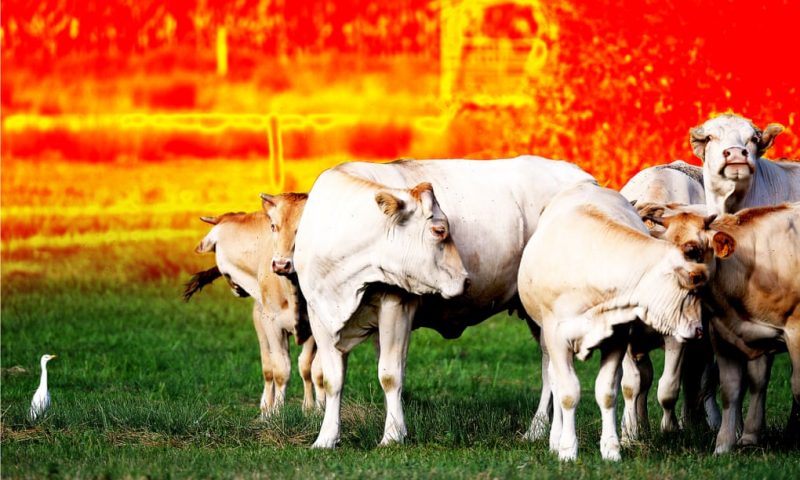Study calls for more focus on farming and food waste, behind a third of greenhouse gas production
Our diets and agricultural production around the world are so carbon-intensive that emissions from the global food system alone would be enough to put the Paris climate goals out of reach, even if all the other major sources of emissions were closed down, research has shown.
Farming and food account for about a third of global greenhouse gas production at present. The world’s food systems produced about 16bn tonnes a year of CO2 from 2012 to 2017.
While emissions from some other carbon-intensive sectors, such as energy generation, have been slowing as clean technology is more widely adopted, farming has received less attention from policymakers. But if emissions from food production continue on current trends, they will rise to a cumulative 1,356 gigatons by the end of the century, according to a study in the journal Science.
That would be enough in itself to heat the world by more than 1.5C by the 2060s, and probably by about 2C by the end of the century. Under the Paris agreement, nations are bound to hold temperature rises to no more than 2C above pre-industrial levels, with an aspiration to a 1.5C limit.
Michael Clark, researcher at the Oxford Martin school and the lead author of the study, said: “There needs to be more focus and more effort to reduce emissions from the food system. Greenhouse gas emissions from food systems have increased due to a combination of dietary changes – more food in general, with a larger proportion of food coming from animal source foods – population size, and how food is produced.”
Deforestation and the conversion of land from peatlands, wetlands and other natural habitats are major contributors to the climate crisis. Other major sources of emissions from food production are artificial fertilisers; methane from livestock; methane from rice in paddyfields; and livestock manure.
Food waste is also leading to excess greenhouse gas emissions: a halving of food waste would bring emissions within the carbon budget for 2C. More efficient farming, including better practices such as targeted fertiliser use, and agroecological farming that produces higher yields, would also help to reduce overall emissions.
If emissions from food production are to be cut to safe levels, diets in rich countries are also likely to have to change. “These countries are primarily those that are middle or high income where dietary intake and consumption of meat, dairy and eggs is on average well above [health] recommendations,” said Clark, citing the UK, the US, Australia, Europe, Brazil and Argentina, and countries such as China where meat consumption is high and increasing.
Any such changes would benefit people’s health and help to solve the obesity crises stalking many rich societies. “Diets need to shift to contain less food in general, such that caloric intake is in line with healthier quantities, and less meat, dairy and eggs, such that consumption of these foods is in line with dietary recommendations,” said Clark.
People would not have to adopt vegan diets, as some have called for, but reduce their consumption of high-carbon foods that are unhealthy in large quantities, such as meat and dairy.
If that was achieved, poor nations could feed their populations better, and could increase their consumption of animal products without exhausting the global carbon budget. Clark said the study showed clearly that all of the world’s increasing population could be fed a healthy diet while meeting the Paris goals, as long as concerted action was taken to reform the global food production system.
The paper does not specify the policy remedies likely to be required, but there are increasing calls from campaigners and health professionals for reform. Earlier this week, health professionals in the UK called for a tax on meat to help tackle the climate crisis and improve health.
Clark told the Guardian: “Taxes might be part of the solution, but they will not be the only solution. If food taxes to reduce emissions are implemented, we need to make sure they are not regressive and do not have a large negative impact on the people least able to afford the tax.”
Joeri Rogelj, the director of research at the Grantham Institute, Imperial College London, who was not involved in the study, said the paper underlined the need for deep reductions in emissions from all sectors of the economy. “No sector is off the hook,” he said. “A steep decline of global CO2 emissions to net zero by mid-century needs to be accompanied by deep reductions in non-CO2 greenhouse gases such as methane and nitrous oxide. We are very close to 1.5C and future emissions of each and every sector will therefore have a strong impact on where we end up in terms of global warming.”

